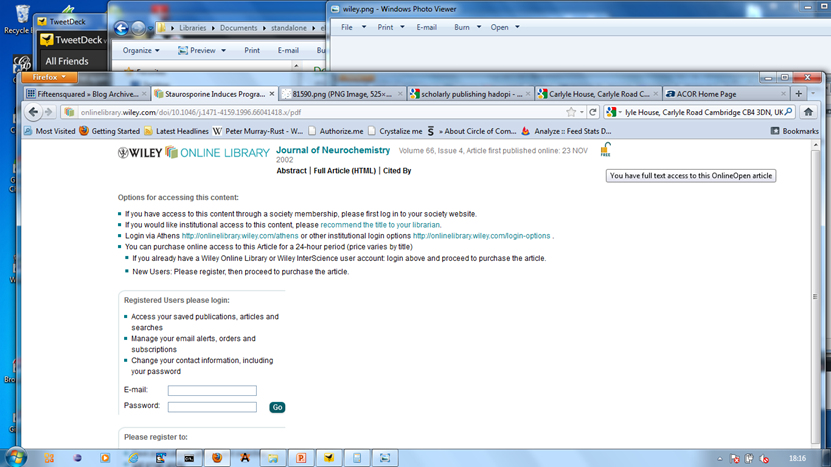I’ve tried to access a publication outside the Cambridge university domain (i.e. pretending I am a Scholarly Poor. Here’s the screenshot

In case you can’t read it, the text includes:
Options for accessing this content:
- If you have access to this content through a society membership, please first log in to your society website.
- If you would like institutional access to this content, please recommend the title to your librarian.
- Login via Athens http://onlinelibrary.wiley.com/athens or other institutional login options http://onlinelibrary.wiley.com/login-options .
-
You can purchase online access to this Article for a 24-hour period (price varies by title)
- If you already have a Wiley Online Library or Wiley InterScience user account: login above and proceed to purchase the article.
- New Users: Please register, then proceed to purchase the article.
- If you already have a Wiley Online Library or Wiley InterScience user account: login above and proceed to purchase the article.
Now there is a little Open padlock at the top right called “Free” and the mouseover says:
“You have Full Text Access to this Online Article”
And yet I don’t.
Do other people get the same?
So Wiley is telling me I have “free” access where “free” seems to indicate I have to pay.
No idea what is going on. My predictions:
- The padlock is a mistake
- The text is actually free but Wiley routes me through a paywall by “mistake”
Let’s see if they even notice this blog. BTW Wiley was the publisher who sent a legal letter to graduate student Shelley Batts for publishing ONE graph without permission.
Welcome to my world: I have been living in “information poverty” as a conscious choice since my split from the BMJ in 2003 when it began paywalling its content.
I find I get served the same deal as you here. It is possible that an article from the 1996 Journal of Neurochemistry would be available free after registering with the publisher, but I have not gone to these lengths.
How does it look from within the bounds of Cambridge University? Do you just get transparent access with no need to login?
It used to be (~2003) that even when I was a legitimate NHS user with an Athens password that I’d have to go and physically sit in the local medical library to access certain content, a self-evidently crazy policy that did nothing to enhance my desire to continue serving the NHS.
Thanks Douglas,
I try to feel your pain. I was talking with some young scientists today and there is no doubt they feel the injustice of the present situation. We must keep pushing.
I agree that it is possible that “free” means free-after-login. If so it is appallingly unclear (aren’t publishers meant to be beacons of clarity?). But, like you, I am not prepared to register with a publisher as an experiment. Goodness knows what that might let me in for.
Peter,
Thanks for this excellent series of posts.
They are a perfect run up for the upcoming
Open Access Week
http://www.openaccessweek.org/
October 24-30
You may also find interesting that the larger
Open Source community is getting interested in
these issues, and is sharing your concerns and
urgency for action.
Here is a recent thread in the Open Source
blog site:
http://opensource.com/education/11/9/copyright-assignment
Many thanks Luis for your continued interest and support.
I am aware of Open Access week – maybe I shall dedicate “Animal garden” to it! They are welcome to it.
If you haven’t looked at it there are a number of TUXen in it.